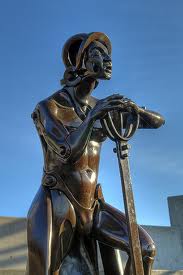It could be viewed as an act of political correctness. The City Council in liberal Seattle voted unanimously this week that the second Monday in October henceforth will be called Indigenous Peoples’ Day, and not Columbus Day, as it’s known in many other places across the country and the entire Federal Government.
Now, there’s nothing new about the campaign to dishonor Christopher Columbus, the Italian working for Spain on a salary-plus-profit-sharing plan who starting in 1492 sailed the ocean blue four times from Europe (and never once actually landed in North America proper). Native Americans–called Indians because Columbus thought he was near India–blame him for triggering the immigration of Europeans carrying deadly illnesses and deadly intentions from the Old World to the New World. Also, Columbus also kidnapped a number of Indians, not all of whom survived the return journey across the Atlantic. This all led to the ultimate relegation of Indians in the social and economic order of things.
Here in Seattle, authorities worried about vandalism long have found it necessary around Columbus Day to crate the remarkably unappealing 1978 statute of Columbus by sculptor Douglas Bennet along the Seattle waterfront near the Seattle Aquarium. (Putting statues of famous explorers along waterways they never saw is something of a grand Seattle tradition; there is also a 17-foot-high statue facing Puget Sound of Leif Erikson, the Viking explorer who may have beaten Columbus across the Atlantic by 500 years but also came nowhere near the Pacific Northwest.)
However, in implicitly blaming Columbus for the downfall of local Indians, I find Seattle politicians somewhat disingenuous. Sure, the city was named for the local Indian chief. But Seattle and his tribes were quickly hustled out of town by gringos arriving from Illinois in the mid-19th century, their lands taken for little compensation and treaty obligations not fulfilled. The new, growing city on the eastern edge of Puget Sound later even made it illegal for Indians to live in the place named for their chief.
To my New To Seattle mind, about the best that can be said about the Indian exodus from here is that unlike the history of much of the West–and a fair amount of the East, for that matter–relatively little blood was shed in the run-up.
Seattle’s sticking it to Columbus reminds me of what happened here two years ago when the 5th Avenue Theatre staged a production of the celebrated Rodgers and Hammerstein musical Oklahoma!. The show was set in 1906 in largely white Oklahoma, with nary a hint in the tuneful plot touching on race relations. But for some reason the show’s creative brains here cast as the heavy a black man, injecting a bizarre, totally incomprehensible racial element into the storyline.
The casting caused local controversy, which a delighted 5th Avenue Theatre management capitalized upon by staging a series of pre-show discussions about race relations–in Oklahoma in 1906. As I wrote then, what really should have been discussed was Seattle’s own dreadful history of racial segregation, probably the most virulent, sweeping and persistent of any major city outside the South. To this day, in terms of population percentages, Seattle remains among the five whitest big cities in the country.
Since Columbus Day in Seattle isn’t a state or local holiday, any day of the year could have been designated Indigenous Peoples’ Day. So here’s my big idea: Move the new designation to November 13. In Seattle now that’s Founders’ Day–the official anniversary of the big day in 1851 when the Denny Party, the first boatload of land-hungry Yankees, landed at Alki Point on the tip of West Seattle, supposedly with Chief Seattle waiting to greet them.
Now that really would pin the tail on the correct donkey.

